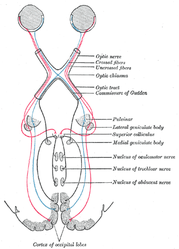
Bio-Psychological Research: Sensation, Perception, Vestibular System
by bhthanks
Sensation and perception, vestibular system, consciousness, bio-psychological research & neuropsychological patients
Sensation & Perception
Mechanisms of perception are the five physical senses: sight, hearing, touch, taste, smell. We learn 80-85% through our eyes. The eyes have a significant impact on perception and so does the mouth for tasting, the ears for hearing, the nose for smelling, and the skin for touching and feeling. There's a lot of biology in the five basic senses of perception.
Perception and Sensation
Sensation and Perception Psychology
 | Sensation and Perception, 8th EditionCengage Learning / |
 | Agenda 2: Masters of DeceitOnly $12.99 |
Vestibular and kinesthetic system
In addition to the five senses, there are also the vestibular and kinesthetic systems. The vestibular is the balancing system in the ear canals. Kinesthetic is how our body coordinates in space, how the musculoskeletal system works in balance, especially during movement. All seven of these interact very intricately, not separately. It operates autonomically, without us thinking about it. It is absolutely fascinating and amazing to see how all this happens.
Vestibular System
vestibular sense
 | The Vestibular System: A Sixth SenseOxford University Press / |
 | The Great Balancing Act: An Insider’s Guide to the Human Vestibular SystemColumbia University Press / Only $30.0 |
The Progression of Consciousness, Sensation & Perception
Some sensory pathways control behavior directly without producing conscious perceptions, whereas others control behavior by mediating conscious perceptions. These are the implications of the fact of how consciousness progressed.
Animals are not aware of self, but are conscious. Humans are aware of themselves, and have a more advanced reaction to stimuli. It had to develop through conscious awareness of ourselves. Humans react as independent individuals.
Consciousness progressed, so there is distinction between ourselves and things around us. We are aware that we are separate and unique. Animals are only aware of themselves as part of a unit. Animals react in mass to an attacker. Humans, on the other hand, perceive separation from their unit. We have preferences, while baboons can't tell the differences.
Perception Psychology
 | The Ecological Approach to Visual Perception (Psychology Press & Routledge Classic Editions)Psychology Press / |
Bio-psychological research and neuropsychological patients
One purpose of bio-psychological research is to help neuro- psychological patients, but neuro- psychological patients also help bio-psychologists understand the neural mechanisms of psychological processes. When the brain is physically malfunctioning, this causes physical and emotional poor health, memory problems and lots of other issues. When psychologists deal with these patients and study the parts of the brain, they keep improving scanning techniques and their understandings of the scans, and the ability to see the activity in the brain. 80% of learning disabilities are in males. Female brains have reading centers on both sides, while males only have a reading center on the left side. We now know this from studying the brain. Females learn to read faster, and recover more quickly from reading disabilities. Males have more math parts in the brain. We know where to look in the brain to pinpoint whether it's biological problems or an emotional, learnt problem and if the brain is fine. The neuropsychologist studies each patient, writes up his findings, accumulates information and gets better knowledge of why and how things work.
Bio-psychological research
 | Psychology Research Biographical Sketches and Research Summaries (Psychology Research Progress)Nova Science Pub Inc / Only $62.43 |
 | Biotics Research Bio FCTS Broad Spectrum Bioflavonoids, Vitamin C, Quercetin, Strong Antioxidant,...BIOTICS / Only $33.48 |
Comparative bio-psychological research on humans and animals
Comparative bio-psychological research often focuses on species that are similar to humans in key respects; however, such research sometimes focuses productively on species that differ from humans in key respects.
Some birds mate for life. While bird spouses stay, children fly off and forget that they're related to one another. They eat differently, their brains are much simpler, they can't speak and they have a very little social unit. Baby birds leave when they mature.
However, humans are very different from animals. We have more differences than similarities. Humans can survive through big challenges, but animals are not so quick to figure out survival tactics. Animals are easier and simpler to study and understand. The human brain is so intricate and the body is so complex. Animals don't have the conscious ability to do certain things.
Image Source: http://en.wikipedia.org/wiki/File:Gray722.png (public domain, copyright expired)
http://en.wikipedia.org/wiki/Sensory_system
You might also like
Custom Ernst Haeckel on T-Shirts and GiftsAre you excited about biology? Zazzle is the comprehensive POD for Ernst Hae...
SleepCan't sleep? Sleeping too much? Always tired? Importance of sleep, how to go ...



 eFaxon 05/11/2012
eFaxon 05/11/2012
 BNSF's Case of Illegal Genetic Screening in the Workplaceon 01/01/2012
BNSF's Case of Illegal Genetic Screening in the Workplaceon 01/01/2012
 Delicious Cake Recipes From Scratchon 04/03/2012
Delicious Cake Recipes From Scratchon 04/03/2012
 Easy and Delicious Recipes for Newbieson 04/03/2012
Easy and Delicious Recipes for Newbieson 04/03/2012



Comments